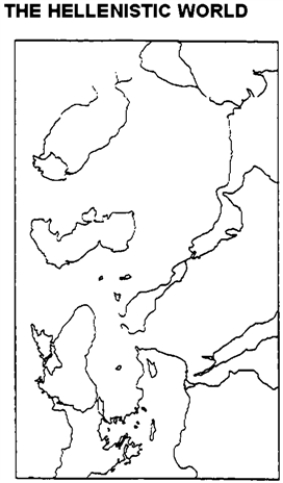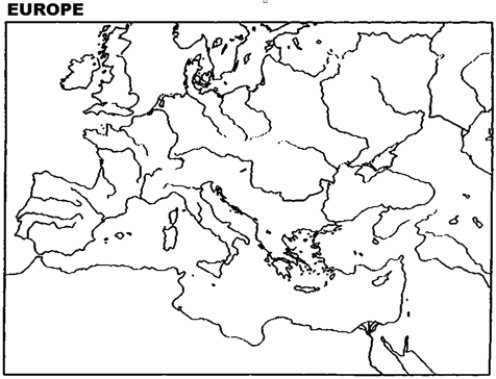Exam 3: The Greeks: From Myth to Reason
Exam 1: The Ancient Near East: the First Civilizations82 Questions
Exam 2: The Hebrews: a New View of God and the Individual74 Questions
Exam 3: The Greeks: From Myth to Reason95 Questions
Exam 4: Rome: From City-State to World Empire93 Questions
Exam 5: Early Christianity: a World Religion79 Questions
Exam 6: The Rise of Europe: Fusion of Classical, Christian, and Germanic Traditions89 Questions
Exam 7: The Flowering and Dissolution of Medieval Civilization84 Questions
Exam 8: Transition to the Modern Age: Renaissance and Reformation92 Questions
Exam 9: Political and Economic Transformation: National States, Overseas Expansion, Commercial Revolution84 Questions
Exam 10: Intellectual Transformation: the Scientific Revolution and the Age of Enlightenment86 Questions
Exam 11: The Era of the French Revolution: Affirmation of Liberty and Equality92 Questions
Exam 12: The Industrial Revolution: the Transformation of Society79 Questions
Exam 13: Thought and Culture in the Early Nineteenth Century82 Questions
Exam 14: Surge of Liberalism and Nationalism: Revolution, Counterrevolution, and Unification78 Questions
Exam 15: Thought and Culture in the Mid-Nineteenth Century: Realism, Positivism, Darwinism, and Social Criticism86 Questions
Exam 16: Europe in the Late Nineteenth Century: Modernization, Nationalism, Imperialism93 Questions
Exam 17: Modern Consciousness: New Views of Nature, Human Nature, and the Arts78 Questions
Exam 18: World War I: the West in Despair83 Questions
Exam 19: An Era of Totalitarianism87 Questions
Exam 20: World War 2: Western Civilization in the Balance55 Questions
Exam 21: Europe After World War 2: Recovery and Realignment, 1945-198963 Questions
Exam 22: The Troubled Present55 Questions
Select questions type
Why did Athens become the center of Greek intellectual, artistic, and philosophical advancements?
(Short Answer)
4.8/5  (37)
(37)
The Greek thinker most associated with the study of medicine was
(Multiple Choice)
4.8/5  (34)
(34)
All of the following statements are true of the Peloponnesian War except
(Multiple Choice)
4.9/5  (35)
(35)
Please define the following key terms. Show Who? What? Where? When? Why Important?
-Socrates
(Essay)
4.8/5  (37)
(37)
Which of the following speculated that the world was composed of atoms?
(Multiple Choice)
4.8/5  (40)
(40)
Please use this outline map of the Hellenistic world to answer the question(s).
 -How were Athenian views of democracy, human rights, and freedom different from those prevalent in contemporary America?
-How were Athenian views of democracy, human rights, and freedom different from those prevalent in contemporary America?
(Essay)
4.8/5  (47)
(47)
Please define the following key terms. Show Who? What? Where? When? Why Important?
-Sappho
(Essay)
4.8/5  (44)
(44)
The Hellenistic thinker that taught that people should reject civic life
(Multiple Choice)
4.9/5  (39)
(39)
Please use this outline map of the Hellenistic world to answer the question(s).
 -It has been said by some that great men make history. To what extent would you apply this principle to Greece?
-It has been said by some that great men make history. To what extent would you apply this principle to Greece?
(Essay)
4.9/5  (45)
(45)
Please use this outline map of Europe to answer the question(s).
 -On the map of Europe, locate the following: Crete, Athens, Sparta, Sicily, Ionia, Delphi, Olympia, the Aegean Sea, the Ionian Sea, the Gulf of Corinth, and the Peloponnesus.
-On the map of Europe, locate the following: Crete, Athens, Sparta, Sicily, Ionia, Delphi, Olympia, the Aegean Sea, the Ionian Sea, the Gulf of Corinth, and the Peloponnesus.
(Short Answer)
4.9/5  (40)
(40)
Showing 81 - 95 of 95
Filters
- Essay(0)
- Multiple Choice(0)
- Short Answer(0)
- True False(0)
- Matching(0)